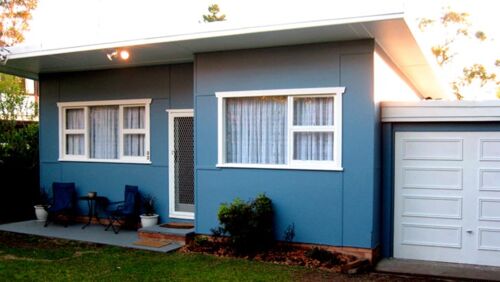Engineered stone banned from 2024 - here are eight alternatives
By Georgia Madden
Engineered stone will be banned in most Australian states and territories from next year after it was linked with a rise in silicosis in tradespeople.
Workplace ministers from the Commonwealth and states and territories agreed to the ban after meeting on Wednesday.
More than half a million Australian workers are exposed to silica dust, according to the CFMEU, and 600 workers in NSW, Victoria and Queensland have silicosis, a lung disease caused by inhaling the dangerous dust.
The ban on engineered benchtops will come into effect in most Australian states and territories from July 1, with consumers warned not to rush to place orders as they may not be fulfilled.
Major retailers including IKEA and Bunnings announced last month they would be removing engineered stone from their shelves.
So, if you're planning a new kitchen, you will need to consider an alternative material. Fortunately, there are several to choose from.
1. Solid surface
A synthetic solid surface like Corian is hardwearing and hygienic, and can be moulded to include sinks and splashback, giving your kitchen a seamless aesthetic.
"Most of our customers who have had solid surface in their previous kitchen will choose it again," says Graeme Metcalf, multi-disciplinary designer at Dan Kitchens Australia.
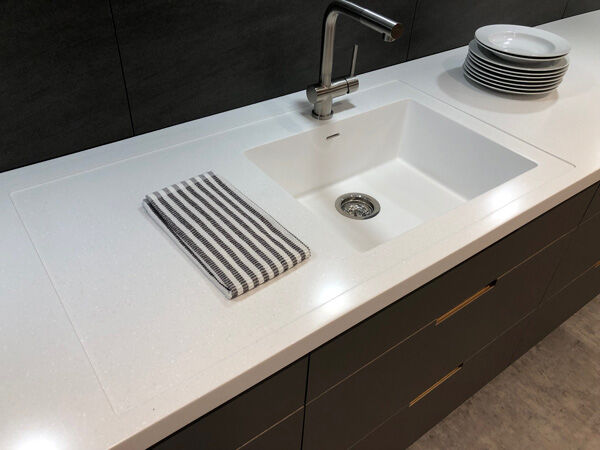
"It comes in many colours, it's easy to repair and remove stains, and scratches can be removed. It's also great for difficult sites, like apartments, where delivering a stone slab would be problematic."
Prices sit around $1200 per square metre, uninstalled.
2. Marble
For all-out luxury and lasting appeal, nothing beats marble. But it is costly and requires ongoing care.
"Marble is one of the least practical materials for a kitchen," says Metcalf. "While its porosity gives it a translucence like no other benchtop material, this, combined with its softness, means that spills need to be wiped immediately to prevent staining and etching.
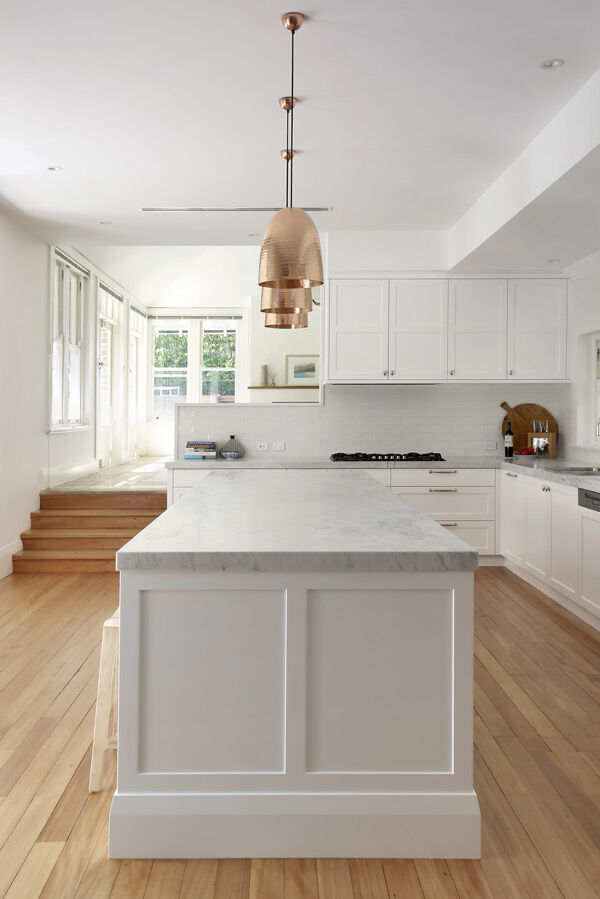
"A protective sealer can be applied, but it's not perfect. If you like a material that ages and patinas, and you can look past the odd ring mark, you might consider marble."
Expect to pay between $350 and $2500 per square metre, uninstalled.
3. Granite
Granite, with its beautiful, unique veining, is another natural stone that will add long-term value to your kitchen.
It's incredibly hardwearing, comes in many colours and patterns and, with proper care, will enhance your kitchen for decades.
"Granite is easy to clean, scratch-, stain-, heat- and chemical-resistant. Protective sealers can be applied, but you'll need to redo them over time," says Metcalf.
Granite ranges from $350 to $2000 per square metre, uninstalled.
4. Porcelain
"Porcelain is virtually bulletproof - it's highly durable as well as stain-, scratch- and heat-resistant," says Gemma Haddock, a designer at Collaroy Kitchen Centre.
You can order it in huge slab sizes to create sprawling, joint-free benchtops, and it doesn't require sealing.
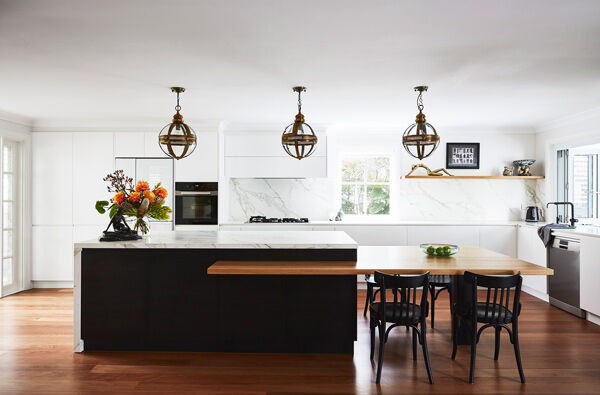
Porcelain comes in endless colours and patterns, including ones that replicate stone, rusted steel and concrete.
However, patterns don't run right through the material, so the edges are plain and, plus they're prone to chipping. Porcelain is roughly $250 to $600 per square metre, uninstalled.
5. Laminate
If you're less concerned with luxury and more with keeping your kitchen cost down, laminate benchtops are a smart, budget-friendly option. You can install it yourself to save even more. Laminate comes in hundreds of colours, patterns and finishes, including ones that replicate natural stone, timber and concrete.
"It's non-porous, so there's no risk of staining, but it's not heat-resistant and it can scratch. You'll also need to seal sink cut-outs with silicone to avoid water damage," says Haddock.
Budget-friendly laminate costs between $120 and $400 per linear metre x 600-millimetre width, while premium laminate can cost as much as stone.
6. Stainless steel
Tough, sleek and hygienic, stainless steel benchtops are a mainstay in professional kitchens.
"They are easy to clean and will withstand a lot of abuse, making them a good option for busy kitchens," says Haddock.
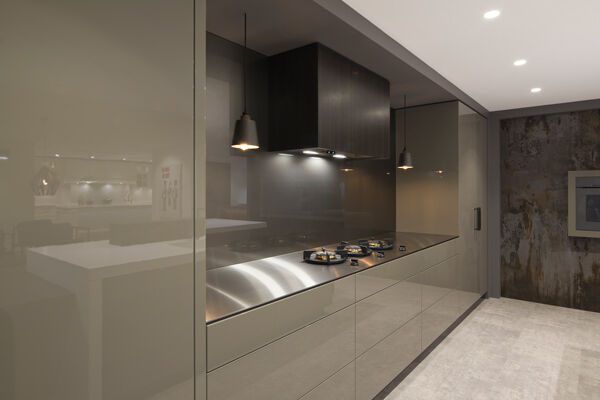
"However, they will scratch and dent over time, so don't expect that perfect brushed finish to remain unblemished," adds Metcalf.
It costs from around $900 per square metre, uninstalled, depending on the steel thickness, the skill of the fabricator and if you want a sink or cooktop welded in.
7. Concrete
Robust yet refined, a concrete benchtop makes a statement.
Commonly poured on-site, a concrete benchtop can be customised with oxides, additives or aggregates to give it a unique colour and style.
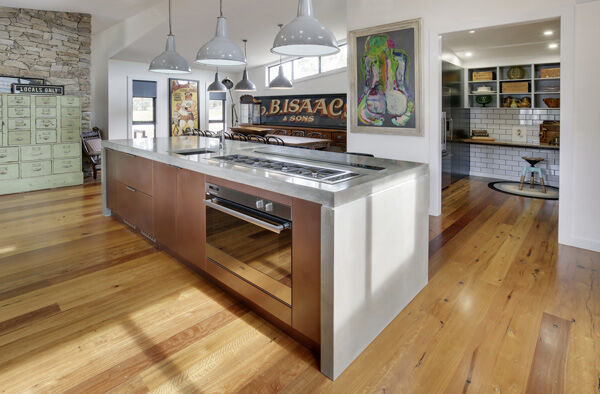
While the raw material is inexpensive, labour is intense, so costs are steep. It's also heavy, so make sure your kitchen floor can take the weight.
"Concrete is porous and will need to be DIY-sealed regularly - as often as once a month in a busy kitchen - to avoid permanent stains," says Haddock. It costs around $1,000 to $1,800 per square metre.
8. Timber
If you're looking to add a warm, natural feel to your kitchen, timber benchtops come out tops.
But they require TLC; the surface can scratch, dent, stain or burn with hot objects.
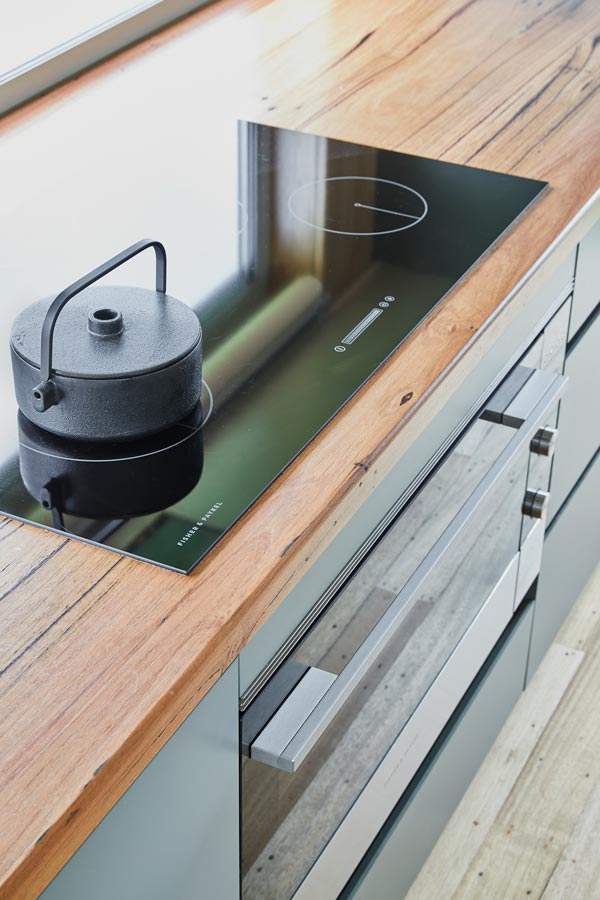
"Consider the species you use and ensure it comes from responsibly managed forests, with certification from a trusted source," say Jade Whittaker and Clara Davis, interior and circularity team leads at Breathe Architecture.
"Or consider a new engineered timber product called Crafted Hardwoods, which is made from harvested timber deemed unsuitable for building use." You'll pay from around $600 to $900 per square metre.
Get stories like this in our newsletters.


